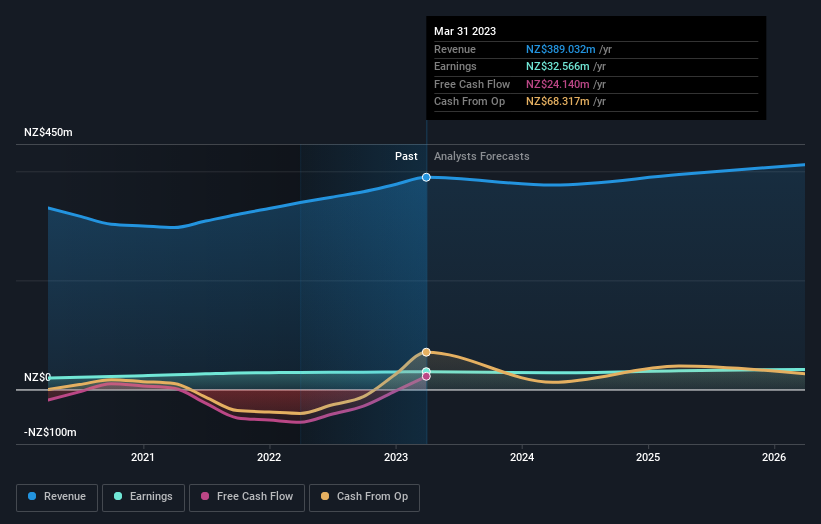Turners Automotive Group Limited's (NZSE:TRA) largest shareholders are individual investors with 59% ownership, private companies own 20%
Key Insights
Significant control over Turners Automotive Group by individual investors implies that the general public has more power to influence management and governance-related decisions
41% of the business is held by the top 25 shareholders
If you want to know who really controls Turners Automotive Group Limited (NZSE:TRA), then you'll have to look at the makeup of its share registry. With 59% stake, individual investors possess the maximum shares in the company. That is, the group stands to benefit the most if the stock rises (or lose the most if there is a downturn).
Meanwhile, private companies make up 20% of the company’s shareholders.
Let's take a closer look to see what the different types of shareholders can tell us about Turners Automotive Group.
Check out our latest analysis for Turners Automotive Group
What Does The Institutional Ownership Tell Us About Turners Automotive Group?
Institutional investors commonly compare their own returns to the returns of a commonly followed index. So they generally do consider buying larger companies that are included in the relevant benchmark index.
We can see that Turners Automotive Group does have institutional investors; and they hold a good portion of the company's stock. This can indicate that the company has a certain degree of credibility in the investment community. However, it is best to be wary of relying on the supposed validation that comes with institutional investors. They too, get it wrong sometimes. When multiple institutions own a stock, there's always a risk that they are in a 'crowded trade'. When such a trade goes wrong, multiple parties may compete to sell stock fast. This risk is higher in a company without a history of growth. You can see Turners Automotive Group's historic earnings and revenue below, but keep in mind there's always more to the story.
Turners Automotive Group is not owned by hedge funds. Bartel Holdings Limited is currently the company's largest shareholder with 12% of shares outstanding. Montezemolo Holdings Limited is the second largest shareholder owning 7.4% of common stock, and Matthew Harrison holds about 5.9% of the company stock. Matthew Harrison, who is the third-largest shareholder, also happens to hold the title of Member of the Board of Directors. Additionally, the company's CEO Todd Hunter directly holds 1.0% of the total shares outstanding.
A deeper look at our ownership data shows that the top 25 shareholders collectively hold less than half of the register, suggesting a large group of small holders where no single shareholder has a majority.
While it makes sense to study institutional ownership data for a company, it also makes sense to study analyst sentiments to know which way the wind is blowing. There is some analyst coverage of the stock, but it could still become more well known, with time.
Insider Ownership Of Turners Automotive Group
The definition of company insiders can be subjective and does vary between jurisdictions. Our data reflects individual insiders, capturing board members at the very least. Company management run the business, but the CEO will answer to the board, even if he or she is a member of it.
Insider ownership is positive when it signals leadership are thinking like the true owners of the company. However, high insider ownership can also give immense power to a small group within the company. This can be negative in some circumstances.
Our information suggests that insiders maintain a significant holding in Turners Automotive Group Limited. Insiders have a NZ$51m stake in this NZ$312m business. This may suggest that the founders still own a lot of shares. You can click here to see if they have been buying or selling.
General Public Ownership
The general public, mostly comprising of individual investors, collectively holds 59% of Turners Automotive Group shares. With this amount of ownership, retail investors can collectively play a role in decisions that affect shareholder returns, such as dividend policies and the appointment of directors. They can also exercise the power to vote on acquisitions or mergers that may not improve profitability.
Private Company Ownership
It seems that Private Companies own 20%, of the Turners Automotive Group stock. It's hard to draw any conclusions from this fact alone, so its worth looking into who owns those private companies. Sometimes insiders or other related parties have an interest in shares in a public company through a separate private company.
Next Steps:
While it is well worth considering the different groups that own a company, there are other factors that are even more important. For instance, we've identified 2 warning signs for Turners Automotive Group (1 can't be ignored) that you should be aware of.
If you are like me, you may want to think about whether this company will grow or shrink. Luckily, you can check this free report showing analyst forecasts for its future.
NB: Figures in this article are calculated using data from the last twelve months, which refer to the 12-month period ending on the last date of the month the financial statement is dated. This may not be consistent with full year annual report figures.
Have feedback on this article? Concerned about the content? Get in touch with us directly. Alternatively, email editorial-team (at) simplywallst.com.
This article by Simply Wall St is general in nature. We provide commentary based on historical data and analyst forecasts only using an unbiased methodology and our articles are not intended to be financial advice. It does not constitute a recommendation to buy or sell any stock, and does not take account of your objectives, or your financial situation. We aim to bring you long-term focused analysis driven by fundamental data. Note that our analysis may not factor in the latest price-sensitive company announcements or qualitative material. Simply Wall St has no position in any stocks mentioned.


